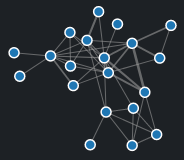Fourth International Workshop on
High Performance Big Graph Data
Management, Analysis, and Mining
December 11, 2017
To be held in conjunction with the
2017 IEEE International Conference on Big Data (IEEE BigData 2017)
The Westin Copley Place, Boston, MA, USA
Workshop Description
Modern Big Data increasingly appears in the form of complex graphs and networks. Examples include the physical Internet, the world wide web, online social networks, phone networks, and biological networks. In addition to their massive sizes, these graphs are dynamic, noisy, and sometimes transient. They also conform to all five Vs (Volume, Velocity, Variety, Value and Veracity) that define Big Data. However, many graph-related problems are computationally difficult, and thus big graph data brings unique challenges, as well as numerous opportunities for researchers, to solve various problems that are significant to our communities.
Big graph problems are currently solved using several complementary paradigms. The most popular approach is perhaps by exploiting parallelism, through specialized algorithms for supercomputers, shared-memory multicore and manycore systems, and heterogeneous CPU-GPU systems. However, since real-world graphs are sparse and highly irregular, there are very few parallel implementations that can actually deliver high performance. The major challenges to scaling and efficiency include irregular data dependencies, poor locality, and high synchronization costs of current approaches. In addition to parallelism, researchers are developing approximation algorithms that use sampling for compressing and summarizing graph data. Streaming algorithms are also being considered for scenarios where the rate of updates is too fast to process the entire graph in a single pass. Further, out-of-core algorithms are necessary for massive graphs that do not fit in the main memory of a typical system. Researchers can use graph-based solutions for solving problems from many diverse disciplines, including routing and transportation, social networks, bioinformatics, computational science, health care, security and intelligence analysis.
This workshop aims to bring together researchers from different paradigms solving big graph problems under a unified platform for sharing their work and exchanging ideas. We are soliciting novel and original research contributions related to big graph data management, analysis, and mining (algorithms, software systems, applications, best practices, performance). Significant work-in-progress papers are also encouraged. Papers can be from any of the following areas, including but not limited to:
- Parallel algorithms for big graph analysis on HPC systems
- Heterogeneous CPU-GPU solutions to solve big graph problems
- Extreme-scale computing for large graph, tensor, and network problems
- Sampling and summarization of large graphs
- Graph algorithms for large-scale scientific computing problems
- Graph clustering, partitioning, and classification methods
- Scalable graph topology measurement: diameter approximation, eigenvalues, triangle and graphlet counting
- Parallel algorithms for computing graph kernels
- Inference on large graph data
- Graph evolution and dynamic graph models
- Graph streams
- Representation Learning for graph data
- Computational methods for visualization of large-scale graphs
- Deep Learning based models for learning on graph data
- Graph databases, novel querying and indexing strategies for RDF data
- Novel applications of big graph problems in bioinformatics, health care, security, and social networks
- New software systems and runtime systems for big graph data mining
Regular paper submissions must be at most 10 pages long, including all figures, tables, and references. They must be formatted according to the style files used by the IEEE BigData 2017 conference proceedings. Additionally, we encourage short paper submissions (at most 6 pages) describing new work in progress.
New this year: The workshop organizers have finalized an agreement with the Editors-in-Chief of the SpringerOpen Data Science and Engineering journal to publish a special issue with a subset of high-quality BigGraphs 2017 workshop papers. Although this is an open access journal, there is no charge for the authors of accepted papers to publish their work in this journal. More information about the special issue will be available soon.
Past Workshops
BigGraphs 2014
BigGraphs 2015
BigGraphs 2016
Important Dates
Oct 15, 2017 (11.59 pm Pacific time): Submission deadline
Nov 6, 2017: Notification of paper acceptance to authors
Nov 20, 2017: Camera-ready submissions due
Dec 11, 2017: Workshop date
Keynote
Jeremy Kepner
MIT Lincoln Laboratory
Talk title: Exascale Designer Graphs
Dr. Jeremy Kepner is a MIT Lincoln Laboratory Fellow. He founded the Lincoln Laboratory Supercomputing Center and pioneered the establishment of the Massachusetts Green High Performance Computing Center. He has developed novel big data and parallel computing software used by thousands of scientists and engineers worldwide. He has led several embedded computing efforts, which earned him a 2011 R&D 100 Award. Dr. Kepner has chaired SIAM Data Mining, the IEEE Big Data conference, and the IEEE High Performance Extreme Computing conference. Dr. Kepner is the author of two bestselling books, Parallel MATLAB for Multicore and Multinode Computers and Graph Algorithms in the Language of Linear Algebra. His peer-reviewed publications include works on abstract algebra, astronomy, astrophysics, cloud computing, cybersecurity, data mining, databases, graph algorithms, health sciences, plasma physics, signal processing, and 3D visualization. In 2014, he received Lincoln Laboratory's Technical Excellence Award.
Dr. Kepner holds a BA degree in astrophysics from Pomona College and a PhD degree in astrophysics from Princeton University.
Workshop Program
December 11, 2017
8 am -- 12.15 pm
Location: St. George C, third floor, The Westin Copley Place, Boston, MA, USA
20-minute oral presentation of papers (17-minute talk and 3 minutes for Q&A)
8.00 am Opening remarks
Kamesh Madduri and Nesreen Ahmed
8.15 am A Parallel Algorithm for Generating a Random Graph with a Prescribed Degree Sequence
Hasanuzzaman Bhuiyan, Maleq Khan, and Madhav Marathe
8.35 am Regular decomposition of large graphs and other structures: scalability and robustness towards missing data
Hannu Reittu, Ilkka Norros, and Fulop Bazso
slides
8.55 am A Generalized Incremental Bottom-Up Community Detection Framework for Highly Dynamic Graphs
Weiyi Liu, Toyotaro Suzumura, Lingli Chen, and Guangmin Hu
9.15 am Strider^R: Massive and Distributed RDF Graph Stream Reasoning
Xiangnan Ren, Olivier Cure, Hubert Naacke, Jeremy Lhez, and Ke Li
slides
9.35 am Practical Approach to Evacuation Planning Via Network Flow and Deep Learning
Akira Tanaka, Nozomi Hata, Nariaki Tateiwa, and Katsuki Fujisawa
slides
10.00 am Coffee break
10.20 am Keynote: Exascale Designer Graphs
Jeremy Kepner
11.10 am GPU-based Parallel Algorithm for Generating Massive Scale-free Networks Using the Preferential Attachment Model
Maksudul Alam and Kalyan S. Perumalla
slides
11.30 am Distributed Memory Parallel Markov Random Fields using Graph Partitioning
Colleen Heinemann, Talita Perciano, Daniela Ushizima, and Wes Bethel
slides
11.50 am Discovering Interesting Patterns in Large Graph Cubes
Florian Demesmaeker, Amine Ghrab, Siegfried Nijssen, and Sabri Skhiri
slides
12.10 pm Closing remarks
Nesreen Ahmed and Kamesh Madduri
Program Committee
Nesreen Ahmed (Intel Labs)
Shaikh Arifuzzaman (University of New Orleans)
Mohammad Al Hasan (Indiana University - Purdue University)
Mansurul Bhuiyan (IBM Research)
Charalampos Chelmis (University at Albany, SUNY)
Nick Duffield (Texas A&M University)
Shobeir Fakhraei (University of Southern California)
Oded Green (Georgia Institute of Technology)
George Karypis (University of Minnesota)
Maleq Khan (Texas A&M University-Kingsville)
Xiangnan Kong (Worcester Polytechnic Institute)
Kamesh Madduri (The Pennsylvania State University)
Jennifer Neville (Purdue University)
Ali Pinar (Sandia National Laboratories)
Sivasankaran Rajamanickam (Sandia National Laboratories)
Ryan Rossi (Palo Alto Research Center)
Tanay Kumar Saha (Indiana University - Purdue University)
A. Erdem Sariyuce (University at Buffalo, SUNY)
George Slota (Rensselaer Polytechnic Institute)
Fengguang Song (Indiana University - Purdue University)
Theodore Willke (Intel Labs)
Yinglong Xia (Huawei Research America)
Baichuan Zhang (Purdue University)
Rong Zhou (Google)

Workshop Organizers
Nesreen Ahmed
Intel Labs
Santa Clara, CA 95054
Mohammad Al Hasan
Department of Computer and Information Science
Indiana University - Purdue University
Indianapolis, IN 46202
Kamesh Madduri
Department of Computer Science and Engineering
The Pennsylvania State University
University Park, PA 16802
Contact
Please send email to one of the workshop organizers.